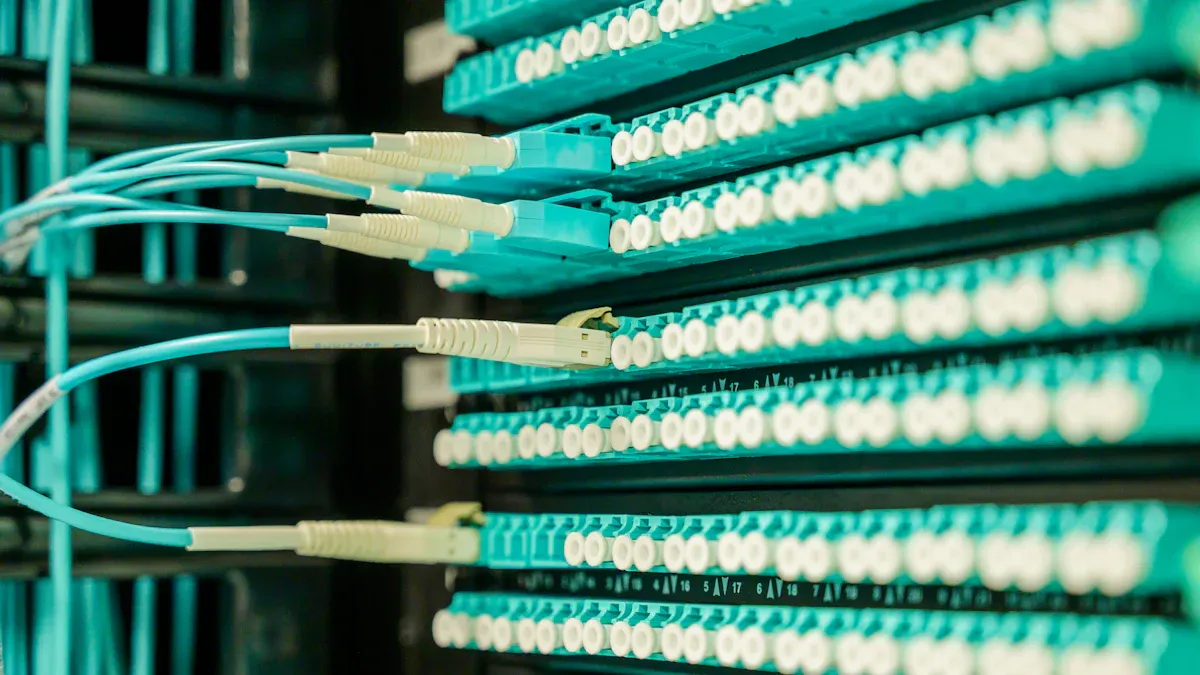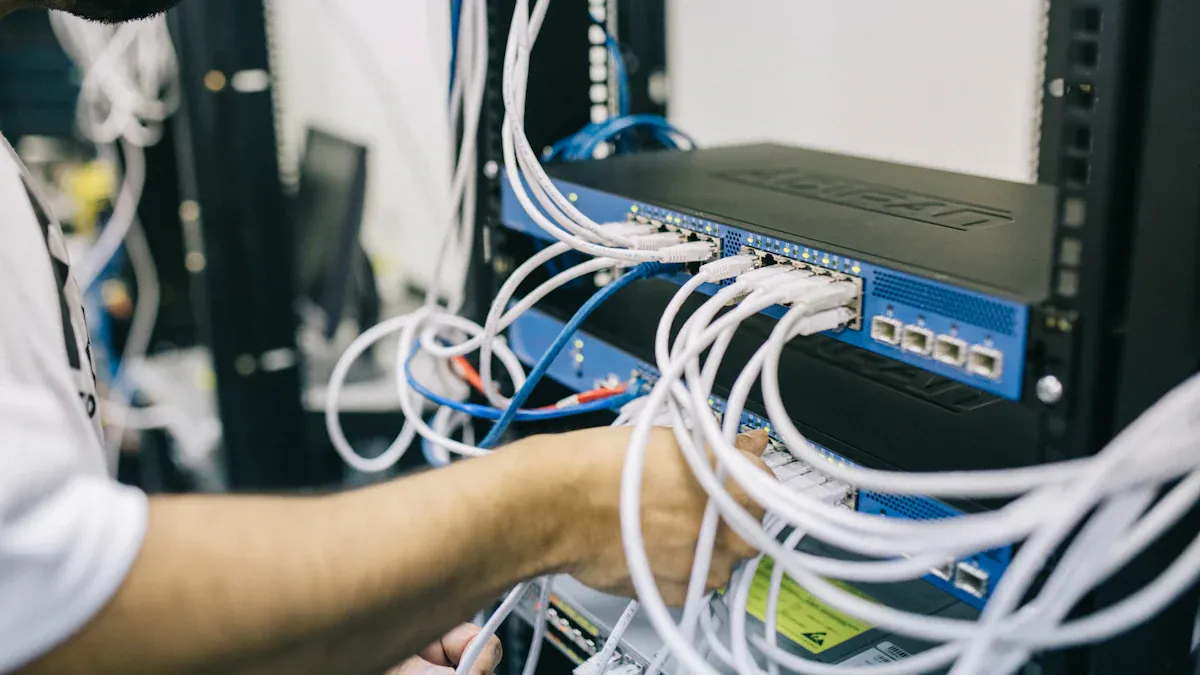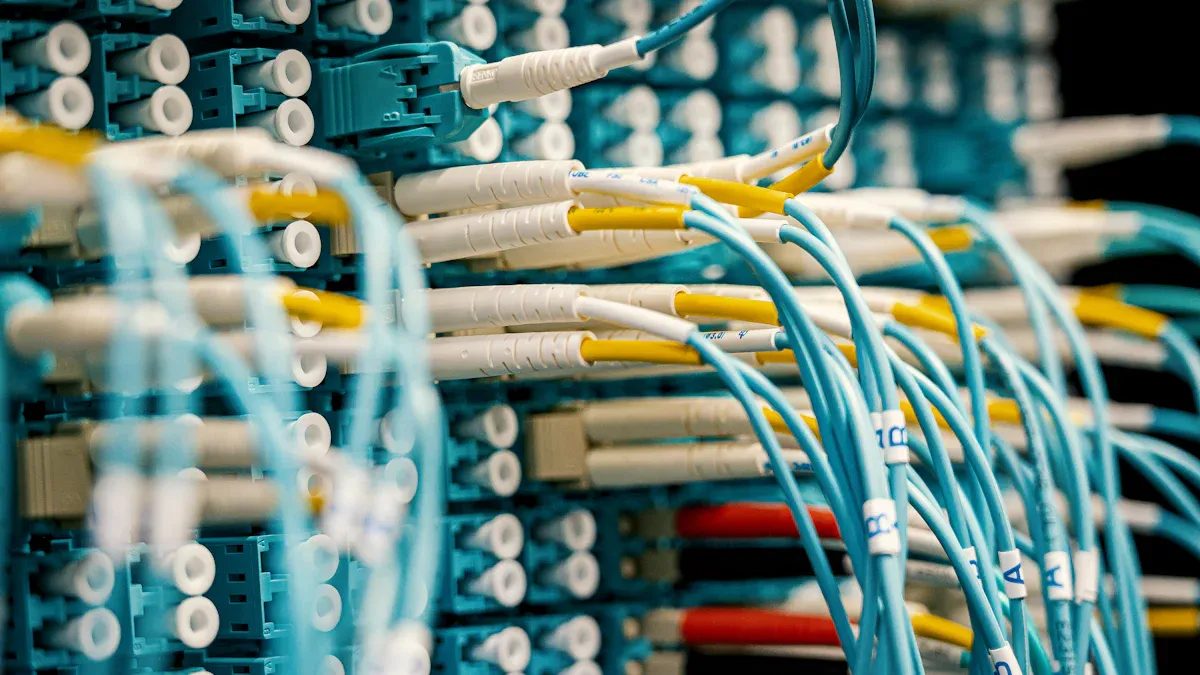Leadership in the data cable industry drives innovation and sets the standard for global connectivity. As the U.S. wires and cables market grows—valued at USD 31.93 billion in 2024 and projected to expand at a 5.9% CAGR by 2030—you witness how industry leaders shape this dynamic sector. Emerging technologies like 5G and IoT demand faster data transmission, making high-quality cables essential. A leading data cable company stands out by delivering cutting-edge solutions, using advanced materials like copper, and meeting the rising demands of industries like construction. These companies define excellence through innovation, quality, and reliability.
Key Attributes of a Leading Data Cable Company
Innovation and Technological Advancements
A leading data cable company thrives on innovation. You see this in their ability to adopt cutting-edge technologies that redefine cable design and manufacturing. Artificial Intelligence (AI) and Machine Learning (ML) play a pivotal role in automating complex tasks and optimizing designs. These technologies not only improve product quality but also enhance efficiency. For instance, predictive AI maintenance can increase equipment uptime by up to 20% and reduce breakdowns by as much as 70%.
Digital fabrication, such as 3D printing, has revolutionized the industry. It allows for rapid prototyping and customization, reducing material waste and costs. The market for 3D printing is expected to grow from $13.7 billion in 2020 to $25 billion by 2025. Cloud computing further supports innovation by enabling real-time collaboration among global teams. This ensures efficient project management and resource allocation. Big data analytics also provides valuable insights into consumer behavior, helping companies forecast demand and tailor their products to meet customer needs.
These advancements ensure that the cables you rely on are not only high-performing but also designed with precision and foresight.
Commitment to Quality and Reliability
Quality and reliability form the backbone of any successful data cable company. You can trust their products because they adhere to stringent quality control benchmarks. Standards like ASTM ensure that testing processes are precise and unbiased. Reliability measurements and uncertainty assessments guide laboratories in designing experiments that prioritize quality.
High-quality materials, such as copper, are essential in cable manufacturing. These materials ensure durability and optimal performance. Companies also implement rigorous quality assurance processes to maintain consistency. Every cable undergoes thorough testing to meet industry standards. This commitment to quality guarantees that the cables you use will perform reliably, even in demanding conditions.
| Standard Type | Description |
|---|---|
| ASTM Standards | Provide mathematical and statistical procedures for evaluating experiments. |
| Reliability Measurement | Includes methods for determining the precision and bias of experiments. |
| Uncertainty Measurement | Guides laboratories in planning and designing experiments with quality focus. |
When you choose a company that prioritizes quality, you invest in products that deliver long-term value and dependability.
Customer-Centric Approach and Custom Solutions
A customer-centric approach sets a leading data cable company apart. These companies understand that your needs are unique. They offer custom cable assemblies tailored to your specific requirements. Whether you need cables for industrial applications or consumer electronics, they provide solutions that fit your needs perfectly.
Customization extends beyond design. Companies also focus on providing exceptional customer service. They work closely with you to understand your challenges and deliver solutions that address them. This approach ensures that you receive products that not only meet but exceed your expectations.
Custom cable assemblies are particularly valuable in industries with diverse needs. For example, the construction sector requires cables that can withstand harsh environments, while the telecommunications industry demands high-speed data transmission. By offering tailored solutions, these companies ensure that you get the right product for your application.
Tip: Look for companies that prioritize customization and customer satisfaction. Their commitment to understanding your needs ensures that you receive the best possible solutions.
Excellence in Manufacturing Custom Cable Assemblies
Advanced Technologies in Manufacturing
You benefit from advanced technologies that redefine the manufacturing process for custom cable assemblies. These technologies improve production efficiency, enhance product quality, and ensure precision in every design. For example, robotic arms increase production speed by 40%, making them invaluable in industries like automotive assembly. Similarly, 3D printing boosts manufacturing performance by 20%, enabling the creation of intricate designs while reducing material waste. Smart factory technology further enhances production output by 15%, minimizing downtime and streamlining operations.
| Technology | Improvement Percentage | Description |
|---|---|---|
| Robotic arms | 40% | Increased production speed in automotive assembly |
| 3D printing | 20% | Improved fuel efficiency in aerospace parts |
| Smart factory technology | 15% | Increased production output and reduced downtime |
These innovations ensure that the cables you rely on are manufactured with world-class precision and efficiency. By leveraging these technologies, a leading data cable company delivers products that meet your exact specifications while maintaining high standards of quality.
Note: Advanced manufacturing technologies not only enhance production but also contribute to sustainable practices by reducing waste and energy consumption.
High-Quality Materials and Components
The use of high-quality materials is essential in manufacturing custom cable assemblies. Materials like copper ensure durability, optimal signal transmission, and reliable performance in various environments. The Production Part Approval Process (PPAP) plays a critical role in maintaining quality. This process ensures that suppliers consistently meet customer requirements, building confidence in their production capabilities.
Custom cables are designed to meet specific application needs, ensuring superior performance. Manufacturers collaborate with you to address unique challenges and provide tailored solutions. Detailed consultations help ensure that every aspect of the manufacturing process aligns with your requirements.
| Aspect | Description |
|---|---|
| Engineering Precision | Custom cable assemblies require meticulous engineering to meet specific application needs. |
| Material Sourcing | High-quality materials are essential for durability and performance in various environments. |
| Advanced Manufacturing Tech | Utilization of modern technologies enhances production efficiency and product quality. |
By prioritizing high-quality materials and components, manufacturers deliver cables that perform reliably, even in the most demanding conditions.
Rigorous Quality Assurance Processes
Quality assurance is the cornerstone of world-class manufacturing. Every step of the manufacturing process undergoes rigorous quality checks to ensure consistency and reliability. Standardized manuals guide data collection and testing procedures, ensuring uniformity across production lines. On-site monitoring verifies compliance with test administration and security guidelines.
| Quality Control Measure | Purpose |
|---|---|
| Standardized manuals | To standardize data collection by providing detailed procedural guidelines for countries to follow. |
| On-site monitoring | To check compliance with test administration procedures and security guidelines. |
| Adherence to sampling procedures | To ensure that sampling protocols are followed at all levels (school, classroom, student). |
| Systematic observation | To gather information on any circumstances during data collection that could affect data quality. |
These measures ensure that every cable meets stringent quality standards. By adhering to these processes, manufacturers deliver products that you can trust for long-term performance and reliability.
Tip: Look for companies that emphasize rigorous quality assurance processes. Their commitment to quality ensures that you receive products that exceed your expectations.
Integrated Systems and Data-Driven Strategies
Automation for Operational Efficiency
Automation transforms the manufacturing process by streamlining operations and reducing manual tasks. You can see its impact in industries where repetitive tasks consume valuable time. For instance, 73% of IT leaders report that automation reduces manual task time by 50%. Businesses also experience cost savings, with automation initiatives cutting expenses by 10% to 50%. Moreover, 78% of business leaders believe automation enhances productivity, making it a cornerstone of world-class manufacturing.
| Improvement Type | Statistic |
|---|---|
| Time Savings | AI-based automation saves up to 2 hours on data analysis and lead qualification. |
| Productivity Increase | Automation improves productivity by up to 48%. |
| Cost Reduction | Businesses save 10% to 50% on operational costs through automation. |
Automation tools like robotic arms and AI-powered systems optimize the production process. These technologies ensure precision in cable design and enhance the efficiency of the manufacturing process. By adopting automation, you not only improve production speed but also achieve consistent quality in every product.
Data Analytics for Continuous Improvement
Data analytics plays a vital role in refining the manufacturing process. It provides insights that help you make informed decisions and improve performance. Tools like descriptive analysis summarize past data, while predictive analysis forecasts future trends. Prescriptive analysis recommends actions to optimize outcomes, ensuring continuous improvement.
| Type of Analysis | Purpose |
|---|---|
| Descriptive Analysis | Summarizes past data to understand what has happened. |
| Predictive Analysis | Forecasts future trends and behaviors using historical data. |
| Prescriptive Analysis | Recommends actions to optimize potential future outcomes. |
| Diagnostic Analysis | Identifies patterns and explains why certain outcomes occurred. |
By leveraging these insights, you can identify inefficiencies in the manufacturing process and implement strategies to address them. This data-driven approach ensures that your production remains aligned with market demands and customer expectations.
Supply Chain Optimization
An optimized supply chain ensures that the manufacturing process runs smoothly from start to finish. Metrics like Service Level Agreements (SLAs) and Multi-Tier Visibility (MTV) help you monitor supplier performance and identify bottlenecks. For example, AI-based supplier performance indices reduce disruptions by 45%, while quantum-optimized freight routing lowers transportation costs by 35%.
| Metric Name | Description | Impact on Optimization |
|---|---|---|
| Service Level Agreements (SLAs) | Sets performance benchmarks for suppliers. | Enhances reliability and mitigates risks. |
| Multi-Tier Visibility (MTV) | Monitors suppliers beyond Tier-1 to identify bottlenecks. | Improves decision-making and reduces uncertainties. |
| Quantum Freight Routing Efficiency | Uses quantum algorithms for efficient freight routing. | Reduces transportation costs by 35%. |
By integrating these metrics into your operations, you can enhance the reliability of your supply chain. This ensures that materials like copper and other high-quality components arrive on time, supporting a seamless manufacturing process.
Customer Satisfaction as a Competitive Edge
Custom Cable Assemblies for Diverse Needs
Custom cable assemblies play a vital role in meeting the unique demands of various industries. You benefit from their versatility, as they cater to sectors like telecommunications, automotive, medical, and renewable energy. These assemblies are designed to address specific customer requirements, ensuring optimal performance in diverse applications. For example, telecommunications rely on high-speed data transmission, while the automotive industry demands durable solutions for harsh environments.
The growing demand for custom cable assemblies reflects advancements in technology and the emergence of new markets. Companies that leverage these opportunities enhance their competitiveness and profitability. Key industries utilizing these assemblies include aerospace, industrial automation, military and defense, and consumer electronics. By choosing a data cable company that specializes in custom solutions, you ensure your needs are met with precision and quality.
Tip: Look for manufacturers that offer tailored solutions to ensure your cables meet the exact specifications of your application.
Ensuring Product Reliability and Longevity
Reliability and longevity are critical factors when selecting cables. Leading manufacturers use rigorous testing processes to guarantee product durability. Stress testing simulates accelerated life conditions, identifying potential failure points. Environmental exposure tests evaluate how temperature, humidity, and sunlight affect the cable’s performance. Repeated usage tests mimic wear and tear, ensuring the product functions effectively over time.
For instance, high-end appliances like Miele washing machines and Vitamix blenders are renowned for their durability, often lasting over 20 years. Similarly, custom cable assemblies undergo stringent testing to ensure they meet your expectations for long-term reliability. This commitment to quality ensures you receive products that perform consistently, even in challenging conditions.
Comprehensive After-Sales Support
Exceptional after-sales support sets a company apart in a competitive market. Metrics like CSAT (Customer Satisfaction Score) and NPS (Net Promoter Score) measure how well a company meets your expectations. First Contact Resolution (FCR) and Customer Effort Score (CES) highlight the ease and efficiency of resolving issues. High scores in these areas reflect a company’s dedication to customer satisfaction.
| Metric | Description |
|---|---|
| CSAT | Measures satisfaction with overall experience, including product and service interactions. |
| NPS | Gauges loyalty by asking how likely you are to recommend the company. |
| FCR | Indicates the percentage of issues resolved on the first contact. |
| CES | Assesses how easy it is to interact with the company. |
Comprehensive support ensures you receive assistance throughout the product lifecycle. Whether you need guidance during installation or help with maintenance, a reliable data cable company prioritizes your satisfaction. This focus on service quality strengthens customer relationships and builds trust.
The Future of the Data Cable Industry
Emerging Trends and Technologies
The data cable industry is evolving rapidly, driven by technological advancements and changing market demands. You can observe several key trends shaping the future. The demand for faster data transmission has led to intensified networking and miniaturization. Smaller, more compact products are becoming essential for industrial connection technology. Modular production systems now favor connectors over direct wiring, offering flexibility and ease of reconfiguration. Machine manufacturers increasingly seek system solutions, preferring ready-to-use assemblies that streamline the manufacturing process.
Another significant trend is the shift from alternating current (AC) to direct current (DC). As more devices adopt DC, the industry faces questions about the future of AC in industrial applications. Despite the rise of wireless technology, cables remain indispensable for reliable data transmission in critical settings. These trends highlight the industry’s commitment to innovation and adaptability.
Sustainability and Eco-Friendly Practices
Sustainability is becoming a cornerstone of the data cable industry. You can see companies adopting eco-friendly practices to reduce their environmental impact. Many manufacturers now prioritize the use of recyclable materials in the production process. This approach minimizes waste and conserves resources. Energy-efficient manufacturing techniques also play a crucial role in reducing carbon footprints. For example, smart factory technologies optimize energy consumption during production, making the process more sustainable.
The industry is also exploring biodegradable materials for cable insulation. These materials break down naturally, reducing long-term environmental harm. By embracing these practices, the data cable industry not only meets regulatory requirements but also aligns with global efforts to combat climate change.
Adapting to Market Evolution
Adapting to market changes is vital for staying competitive. Companies must monitor industry trends, economic shifts, and consumer behavior to anticipate changes. Diversification strategies help businesses explore new market segments or geographic regions, reaching untapped customer demographics. A customer-centric approach ensures that products and services meet individual needs, enhancing satisfaction and loyalty.
Financial management is another critical aspect. Identifying potential risks and developing contingency plans ensures financial flexibility. Companies that adopt these strategies can navigate challenges effectively, maintaining their position as industry leaders.
| Strategy Type | Description |
|---|---|
| Market Research and Analysis | Continuously monitor industry trends, economic shifts, and consumer behavior to anticipate changes. |
| Adaptability and Innovation | Design business structures to be adaptable for quick adjustments to strategies and product lines. |
| Customer-Centric Approach | Tailor marketing and customer service to individual customer needs and preferences. |
| Diversification Strategies | Explore new market segments or geographic regions to reach new customer demographics. |
| Financial Management | Identify potential risks and develop contingency plans to maintain financial flexibility. |
By implementing these strategies, you can ensure your business remains resilient and prepared for future challenges.
A leading data cable company excels by combining innovation, quality, and customer satisfaction. You benefit from their ability to adopt cutting-edge technologies, deliver reliable products, and provide tailored solutions. These companies prioritize your needs, ensuring that every product meets the highest standards of performance and durability.
The future of the industry holds immense potential. Emerging technologies and sustainable practices will drive growth and create new opportunities. By choosing a company that values progress and customer focus, you position yourself to thrive in this evolving landscape.
FAQ
What makes custom cable assemblies better than standard cables?
Custom cable assemblies are tailored to your specific needs. They ensure optimal performance for unique applications, unlike standard cables. You get better durability, precise lengths, and compatibility with your equipment. This customization reduces downtime and improves efficiency in demanding environments.
How do I choose the right data cable company?
Look for companies that prioritize quality, innovation, and customer satisfaction. Check if they offer custom solutions, use high-quality materials, and follow rigorous testing processes. Reading customer reviews and verifying certifications can also help you make an informed decision.
Are eco-friendly cables as reliable as traditional ones?
Yes, eco-friendly cables perform just as well as traditional ones. Manufacturers use advanced materials and processes to ensure durability and efficiency. These cables reduce environmental impact without compromising quality, making them a sustainable and reliable choice for modern applications.
Why is automation important in cable manufacturing?
Automation improves production speed and consistency. It reduces human error and ensures precision in every product. With technologies like robotic arms and AI systems, manufacturers can meet high demand while maintaining quality. This efficiency benefits you by delivering reliable products faster.
Can custom cables handle harsh environments?
Absolutely! Custom cables are designed to meet specific environmental challenges. Manufacturers use durable materials like copper and specialized coatings to withstand extreme temperatures, moisture, and abrasion. These cables ensure reliable performance even in the toughest conditions, making them ideal for industrial and outdoor applications.



